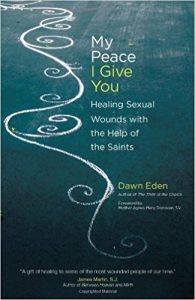My Peace I Give You: Healing Sexual Wounds With the Help of the Saints
 Peace is a common wish for the new year. The peace Dawn Eden holds out to those suffering from sexual wounds is a lot deeper than our casual greetings imply. It is at once more complicated and simpler. The author herself experienced childhood abuse and acknowledges that her own path to peace was not simple.
Peace is a common wish for the new year. The peace Dawn Eden holds out to those suffering from sexual wounds is a lot deeper than our casual greetings imply. It is at once more complicated and simpler. The author herself experienced childhood abuse and acknowledges that her own path to peace was not simple.
“My Peace I Give You” is written in the knowledge that past experiences influence current relationships. The book is not for persons currently involved in an abusive relationship but for those who suffered childhood sexual abuse, one-third to one-half of which is perpetrated by family members.
In order to enjoy present-day peace and healthy relationships, abuse victims must get free from emotional dependency upon their abusers and anyone they expected to protect them (such as a parent) even when complete separation is not possible.
Speaking as a person without specialized knowledge about childhood abuse and the healing process, but with some expertise in family systems, ministry and spirituality, I perceive Eden’s approach as healthy. She recommends the communion of saints as a supportive community and points to particular saints who might guide the sufferer through difficult periods.
Some of Eden’s insights are fascinating. I don’t think I’d ever really noticed that in praying the “Suscipe” with St. Ignatius of Loyola, I offer God my memory. Ancients understood memory as including everything that has entered a person’s consciousness, whether or not actually remembered, and giving a person identity and dreams for the future. Trauma survivors’ brains can bury painful memories so deep they are seemingly inaccessible.
As a soldier St. Ignatius had been wounded. In the “Suscipe” he leads the way in offering conscious and unconscious memories to God, who accepts it all and is able to use everything that has shaped a person — even bad things that happened — to draw us closer.
As a model of someone “who learned to be comfortable in her own skin,” Eden chose St. Therese of Lisieux. A weak and fearful child who lost her mother, Therese grew into a well-integrated young woman of courage.
She remembered childhood trauma in a way that made her stronger. She accepted humiliations as means to discovering her imperfections and reflecting on God’s will. Therese is a good companion for anyone who suffers, for she suffered “in joy and peace.”
Eden relates snippets of her own story. She avoids going into detail about her experiences and those of the saints in order to spare readers possible flashback triggers. Yet she says just enough to make her credible on her subject.
A trove of resources lies in the final 25 pages of the 200-plus-page book. First a “Reader’s Guide” offers discussion questions, followed by full prayers referred to in the text.
Next is a list of print and web readings on many of the saints who serve as models in the book. The “Resources” section contains detailed advice on choosing a spiritual director or a therapist and lists of recommended organizations, websites and books. Finally, there are the chapter notes.
Dawn Eden once worked as a journalist and is the author of a popular book on chastity, written before she confronted much of her past trauma. She is an adult convert to Catholicism who has a master’s degree in theology and is studying toward a doctorate.
About the reviewer
Mary Ann Paulukonis is an artist, writer, speaker and consultant for leadership and ministry.
Disclaimer: Book reviews do not imply and are not to be used as official endorsement by the USCCB of the work or those associated with the work. Book reviews are solely intended as a resource regarding publications that might be of interest to For Your Marriage visitors.




